Top 10 Best Bitcoin Wallets


beginner
Bitcoin has revolutionized the financial landscape, providing an alternative to traditional currencies and a means of transacting without intermediaries like banks. As the popularity of Bitcoin and other cryptocurrencies has grown, so has the need for a secure and easy way to store and manage these digital assets. Enter the Bitcoin wallet — a crucial tool for anyone looking to invest in cryptocurrencies or use them. In this article, we’ll explore what a Bitcoin wallet is, why you need one, and the different types of wallets available, complete with their pros and cons.
I — Daria Morgen, the author of this article (hello!) — have personally tried many of the wallets in this article. As a crypto user for more than 5 years now, I’ve personally gotten a bit pickier with the kinds of wallets I use — I do keep some BTC for future investment, but my primary target is having some ready for everyday purchases and transactions. As a result, I tend to prioritize wallets with well-thought-out usability and streamlined functionality.
Now, before we examine the list of the best Bitcoin wallets you can get, let’s go over what a BTC wallet is and why you might need one.
Table of Contents
What Is a Bitcoin Wallet?
A Bitcoin wallet is a digital storage solution for your Bitcoin and other crypto assets. It allows you to receive, store, and send Bitcoin to other wallets or addresses (and sometimes, even exchange BTC at great rates). At its core, a Bitcoin wallet is essentially a pair of cryptographic keys: one public, which serves as your wallet address, and one private, which allows you to authorize transactions. The security and accessibility of your wallet are paramount, as losing your private key or having it stolen could result in the loss of your funds.
Why do you need a Bitcoin wallet?
Without a Bitcoin wallet, you wouldn’t be able to safely store, send, or receive your digital assets. Wallets provide a way to manage your cryptocurrencies, helping you keep track of your transactions, check your balance, and ensure that your coins are safe and secure.
Types of Crypto Wallets
There is a wide variety of wallet options available, each with its unique features and levels of security and ease of use. We’ll cover the main types of wallets here, highlighting their pros and cons to help you decide which type of wallet is best for your needs.
Please note that these days, you don’t always need to make a choice between hardware and software. Many cold wallets collaborate with existing hot wallets or even have their own computer, mobile app, or browser extension interfaces.
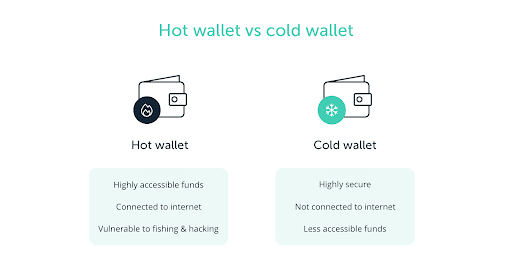

Hot Wallets
Thanks to the connection to the internet, hot wallets are highly convenient for users who need to access their crypto assets regularly. They come in several forms, such as web, desktop, and mobile wallets.
Pros:
- Easily accessible and user-friendly
- Suitable for day-to-day transactions
- Some wallets offer cross-platform options
Cons:
- Vulnerable to cyber attacks and hacking
- Lower level of security compared to cold wallets
Cold Wallets
Cold wallets are offline storage solutions that ensure a higher level of security for your crypto assets. This type of wallet is ideal for those who prioritize security and long-term storage. Examples include hardware wallets and paper wallets.
Hardware Wallets
Hardware wallets are physical devices that securely store your private keys offline. They often come in the form of USB sticks or other portable devices.
Pros:
- Highly secure, as private keys are stored offline
- Often include additional security features, such as two-factor authentication
- Compatible with various cryptocurrencies
Cons:
- More expensive than other wallet options
- Can be lost, damaged, or stolen
Paper Wallets
Paper wallets are physical documents that contain your private and public keys, usually in the form of a QR code. They are considered one of the most secure forms of cold storage.
Pros:
- Secure, as keys are stored offline
- Inexpensive to create
Cons:
- Not as user-friendly as other wallet options
- Can be lost, damaged, or stolen
Multi-Signature Wallets
Multi-signature wallets require multiple parties to sign transactions before they can be executed. This adds an extra layer of security to your wallet and is particularly useful for businesses or organizations managing large amounts of crypto assets.
Pros:
- Enhanced security through multiple signatures required for transactions
- Ideal for businesses or organizations with multiple stakeholders
- Reduced risk of unauthorized access or theft
Cons:
- Less convenient for individual users
- Can be more complex to set up and manage
Choosing the Best Crypto Wallet for Your Needs
When selecting the right wallet for your needs, consider the following factors:
- Level of security. Determine the level of security you require based on the value of your crypto assets and your risk tolerance. Cold wallets, like hardware and paper wallets, offer a higher level of security, while hot wallets are generally more vulnerable to cyber attacks.
- Frequency of use. Consider how often you plan to access your crypto assets. If you need to make frequent transactions, a hot wallet may be more suitable, whereas cold wallets are better for long-term storage.
- Cross-platform options. Some wallets offer cross-platform compatibility, allowing you to access your wallet on multiple devices. This can be a valuable feature if you need to manage your assets on the go or from different devices.
- Supported cryptocurrencies. Ensure that the wallet you choose supports the cryptocurrencies you own or plan to invest in. Some wallets are dedicated to specific cryptocurrencies, while others support multiple coins.
- Ease of use. Look for a wallet with a user-friendly interface and clear instructions for setup and use. This is particularly important if you’re new to the world of cryptocurrencies.
Top 10 Bitcoin Wallets
Coinbase Wallet
- Non-custodial wallet
- Integrated with the Coinbase crypto exchange
- Supports multiple cryptocurrencies
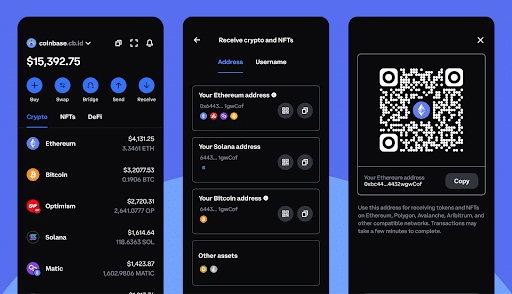

The Coinbase Wallet is a popular choice for both beginners and advanced users due to its user-friendly interface and seamless integration with the Coinbase cryptocurrency exchange. As it is a non-custodial wallet, users maintain full control over their private keys and are not reliant on the exchange for security. Coinbase Wallet supports multiple cryptocurrencies and makes it possible to manage and exchange your assets in a simple manner.
Launched in 2012, Coinbase has grown to become one of the largest and most trusted cryptocurrency exchanges worldwide. The Coinbase Wallet extends the company’s commitment to making cryptocurrencies accessible to a broad audience. With its focus on security, the wallet includes features such as biometric authentication and a seed phrase for account recovery.
Additionally, the Coinbase Wallet is available on both desktop and mobile devices, allowing users to manage their assets on the go. While the wallet itself is free, transaction fees may apply when sending or receiving cryptocurrencies.
Trust Wallet
Trust Wallet is a mobile-first, non-custodial wallet designed for smartphones and other mobile devices. It supports a wide
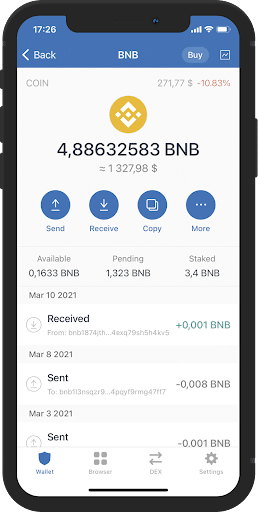

range of cryptocurrencies, including Bitcoin, Ethereum, and numerous tokens built on various blockchains. Trust Wallet is known for its user-friendly interface and advanced features, such as a built-in decentralized exchange (DEX) that enables users to trade tokens directly within the wallet.
Founded in 2017, Trust Wallet was acquired by the popular cryptocurrency exchange Binance in 2018. Since then, the wallet has seen significant growth and development, benefiting from Binance’s resources and expertise. Trust Wallet places a strong emphasis on security and privacy, with features like a seed phrase for account recovery and support for hardware wallets.
Considering its extensive support for different cryptocurrencies and built-in DEX, Trust Wallet is an excellent choice for users who want a versatile and secure wallet for managing their assets. The wallet is available for iOS and Android devices and free to use, though transaction fees may apply.
Trezor
- Hardware wallet
- Offline wallet for enhanced security
- Supports over 1,000 cryptocurrencies
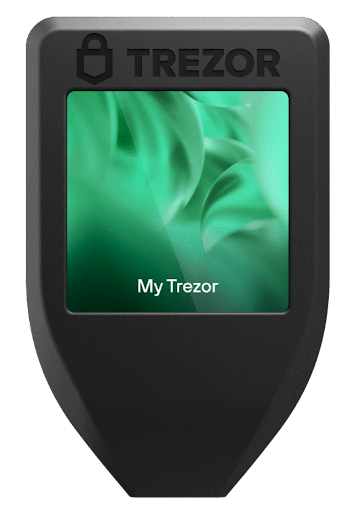

Trezor is a pioneer in the hardware wallet space, enabling users to store their crypto assets offline easily and securely. As an offline wallet, Trezor offers an extra layer of protection against hacks and cyber attacks, making it an ideal choice for those who prioritize the security of their digital assets.
Launched in 2014 by SatoshiLabs, Trezor was the first commercially available hardware wallet for cryptocurrencies. The company has since released two models, the Trezor One and the Trezor Model T, both compatible with over 1,000 cryptocurrencies. Trezor’s intuitive user interface and advanced security features make it a popular choice among beginners and experienced users alike.
In addition to its security features, Trezor includes a built-in exchange for trading cryptocurrencies and supports integration with various third-party wallets and services. While the initial cost of the hardware wallet may be a barrier for some users, the long-term security benefits and peace of mind it promotes are well worth the investment. It’s important to note that while the wallet itself is free from transaction fees, fees may apply when using the built-in exchange or third-party services.
Ledger
- Hardware wallet
- Offline wallet for enhanced security
- Supports over 1,800 cryptocurrencies
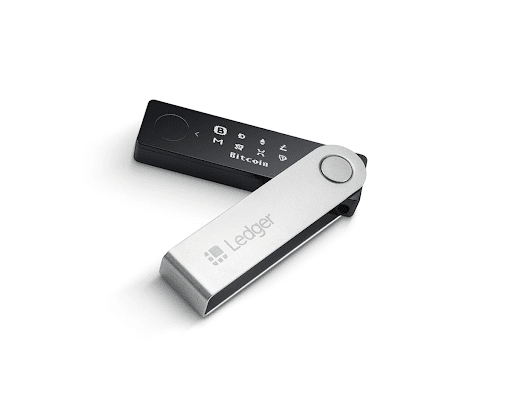

Ledger is another leading hardware wallet provider, offering two models: the Ledger Nano S and the Ledger Nano X. As offline wallets, Ledger devices ensure a high level of security for your digital assets, keeping them safe from hacks and other online threats.
Founded in 2014, Ledger has developed a reputation for producing high-quality, secure hardware wallets that equally cater to beginners and advanced users. Ledger devices support a wide range of cryptocurrencies, including Bitcoin, Ethereum, and numerous altcoins, making them a versatile choice for users with diverse portfolios.
The Ledger Live software, which accompanies the hardware wallet, provides an intuitive interface for managing your assets and includes features such as a built-in exchange and support for staking certain cryptocurrencies. Though the upfront cost of a Ledger device may be a consideration, the long-term security benefits make it a worthwhile investment for many users. As with other hardware wallets, transaction fees may apply when using the built-in exchange or third-party services.
Exodus
- Desktop and mobile wallet
- Built-in exchange for easy trading
- Supports over 130 cryptocurrencies
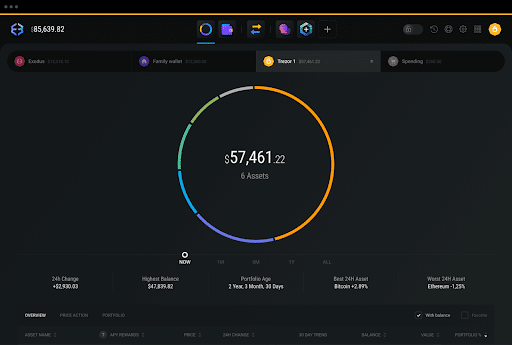

Exodus is a user-friendly, non-custodial wallet available for desktop and mobile devices. It supports a wide range of cryptocurrencies and offers advanced features such as a built-in exchange for trading assets directly within the wallet. This makes it a convenient choice for users who want an all-in-one solution for managing their crypto portfolio.
Launched in 2016, Exodus has gained popularity due to its sleek design and intuitive user interface, which makes it accessible to both beginners and experienced users. The wallet strongly emphasizes security, with features such as a seed phrase for account recovery and encrypted private keys stored on the user’s device.
Although Exodus is free to use, transaction fees may apply when sending or receiving cryptocurrencies, as well as when using the built-in exchange. The wallet also offers 24/7 customer support, which is a valuable feature for users who may need assistance with their wallets or transactions.
Mycelium
- Mobile wallet
- Geared towards advanced users
- Supports Bitcoin and Ethereum


Designed primarily for advanced users, Mycelium is a mobile wallet with a focus on Bitcoin and Ethereum. The wallet boasts a range of advanced features, such as hardware wallet integration, support for multiple accounts, and watch-only addresses, making it a popular choice among experienced cryptocurrency enthusiasts.
Launched in 2013, Mycelium has established itself as a reliable and feature-rich wallet for managing Bitcoin and Ethereum assets. The wallet maintains a high level of security, with private keys stored on the user’s device and protected by a PIN code.
Even though Mycelium’s advanced features may not be suitable for beginners, the wallet is an excellent choice for those with a deep understanding of cryptocurrencies and the technical aspects of wallet management. Mycelium is available for both iOS and Android devices and is free to use; however, transaction fees may apply when sending or receiving cryptocurrencies.
Electrum
- Desktop wallet
- Supports only Bitcoin
- Open-source and well-established
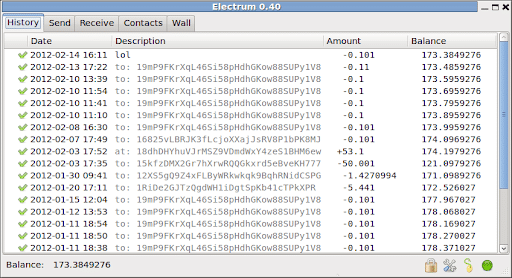

Electrum is a lightweight desktop wallet specifically designed for Bitcoin, offering users a fast and efficient way to manage their assets. As an open-source project, Electrum has a long history of development and has become a trusted and well-established wallet in the Bitcoin community.
First released in 2011, Electrum has evolved over the years to include advanced features such as multi-signature support, hardware wallet integration, and customizable transaction fees. Electrum’s security features include encryption of private keys and a seed phrase for account recovery.
While Electrum’s focus on Bitcoin may limit its appeal to users with diverse cryptocurrency portfolios, it remains an excellent choice for those who primarily deal with Bitcoin and appreciate a streamlined, secure wallet experience. Electrum is available for Windows, macOS, and Linux and is free to use. Transaction fees are determined by the user.
ZenGo
- Mobile wallet
- Keyless wallet with biometric authentication
- Supports multiple cryptocurrencies
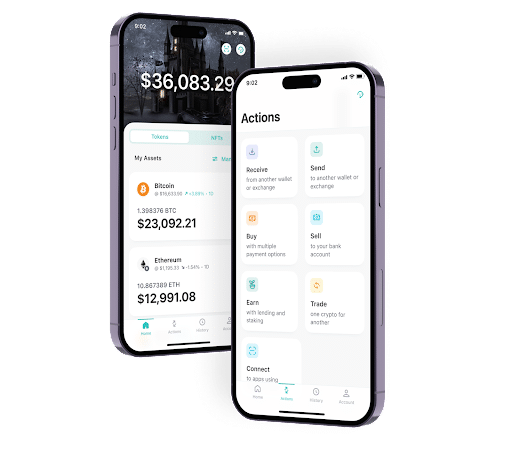

ZenGo is an innovative mobile wallet that eliminates the need for a seed phrase or private key, instead relying on biometric authentication and a unique cryptographic protocol for account recovery. This approach simplifies the wallet experience and reduces the risk of users losing access to their assets due to misplaced or forgotten seed phrases.
Launched in 2019, ZenGo has quickly gained recognition for its innovative approach to wallet security and user experience. The wallet supports multiple cryptocurrencies, including Bitcoin, Ethereum, and various tokens, making it a versatile choice for users with diverse portfolios.
ZenGo’s focus on simplicity and security makes it a popular choice for beginners and experienced users alike. The wallet is available for iOS and Android devices and is free to use, although transaction fees may apply when sending or receiving cryptocurrencies.
Jaxx Liberty
- Cross-platform wallet
- Supports over 90 cryptocurrencies
- Built-in exchange and portfolio tracker


Jaxx Liberty is a cross-platform wallet that allows users to seamlessly manage their cryptocurrency assets across multiple devices. Supporting over 90 cryptocurrencies, Jaxx Liberty is a comprehensive solution for users with diverse portfolios.
Launched in 2014 by Decentral, Jaxx Liberty has become a popular choice due to its user-friendly interface and extensive feature set, which includes a built-in exchange for trading cryptocurrencies, a portfolio tracker, and market data. The wallet also puts a strong emphasis on security: private keys are stored on the user’s device and protected by a seed phrase for account recovery.
Jaxx Liberty’s cross-platform compatibility and extensive support for various cryptocurrencies make it an appealing option for users who need to manage their assets on different devices or operating systems. The wallet is available for iOS, Android, Windows, macOS, and Linux. It is free, yet transaction fees may apply when sending or receiving cryptocurrencies or using the built-in exchange.
BC Vault
- Hardware wallet
- Unique form factor and design
- Supports over 2,000 cryptocurrencies
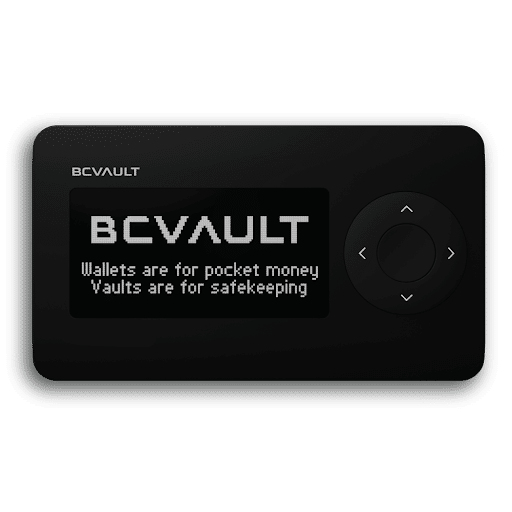

BC Vault is a hardware wallet that stands out due to its unique form factor and design, which resembles a USB drive with an embedded screen and buttons. It offers users a secure and convenient way to store and manage a wide range of cryptocurrencies, supporting over 2,000 assets.
Launched in 2018 by REAL Security, BC Vault has quickly gained a reputation for its high level of security and ease of use. The wallet’s unique features include encrypted backups, support for multiple wallets and accounts, and a built-in exchange powered by Changelly. BC Vault’s security is further enhanced by its reliance on a secure element chip, powering robust protection for your private keys.
While the initial cost of a BC Vault device may be a barrier for some users, its advanced security features and support for a wide array of cryptocurrencies make it an attractive option for those seeking a reliable and versatile hardware wallet. As with other hardware wallets, transaction fees may apply when using the built-in exchange or third-party services.
Conclusion
As a crypto user myself, I have had quite a lot of experience using all kinds of cryptocurrency wallets. Although, indeed, cold wallets are the best for storing large amounts of crypto assets, I found that I tend to gravitate towards mobile wallets due to their ease of use. Since I mostly use crypto for transactions and various payments, having an app readily available on my phone at all times is incredibly convenient.
Finding the right Bitcoin wallet is essential for anyone looking to invest in or use cryptocurrencies. Consider your personal needs and preferences when selecting the best crypto wallet for you, and always prioritize the security and protection of your digital assets. By understanding the different types of wallets and their respective pros and cons, you can make an informed decision and confidently manage your crypto assets.
FAQ
What is the best crypto to buy now?
Cryptocurrencies like Bitcoin or Ethereum are typically the safest choice if you aren’t sure what cryptocurrency you want to buy. If you want to check out some other coins and tokens, see this article on our blog.
What is better, crypto hardware wallets or software wallets?
The choice between crypto hardware wallets and software wallets depends on the user’s priorities and requirements. Hardware wallets, also known as cold storage wallets, provide more secure coin storage as they are offline devices that protect your private keys from hacks and other online threats. On the other hand, software wallets, often referred to as online wallets, offer more convenience and accessibility because they can be easily accessed from your computer or mobile device for quick crypto transactions.
What is the most secure Bitcoin wallet?
The most secure Bitcoin wallet is typically a decentralized crypto wallet that employs strong security measures. Hardware wallets, such as Trezor and Ledger, are considered among the most secure options because they store your private keys offline, away from potential hackers. These cold storage wallets introduce an additional layer of protection for crypto investors who prioritize the safety of their digital assets.
What is the best Bitcoin wallet?
The choice of the best Bitcoin wallet is a matter of individual needs and preferences. For users seeking an all-in-one crypto wallet that is user-friendly and supports multiple cryptocurrencies, wallets like Exodus or Trust Wallet might be the ideal choice. If you prioritize security and don’t mind spending on a hardware wallet, Trezor or Ledger could be a better fit. For those looking for the best free crypto wallet, software wallets such as Electrum (for Bitcoin) or Mycelium (for Bitcoin and Ethereum) are popular options.
How does a Bitcoin wallet work?
A Bitcoin wallet works by providing users with a secure way to store, send, and receive Bitcoin and other digital assets. The wallet functions using a combination of public and private keys, which are essential for carrying out transactions. The public key serves as your wallet address, which you can share with others to receive Bitcoin. In contrast, the private key must remain confidential, as it is used to authorize outgoing transactions and access the funds stored in your wallet.
There are various types of Bitcoin wallets, such as cold wallets (or cold storage wallets), which are offline devices like the popular hardware wallet Ledger Nano S Plus, or digital wallets, which can be accessed through the software on computers or mobile devices. Each type of wallet offers a different level of security and convenience, so it’s essential to choose the best crypto wallet that aligns with your needs and preferences.
How do I get a Bitcoin wallet?
To get a Bitcoin wallet, you can choose from a range of options, including hardware wallets, software wallets, and mobile wallets, each supporting an array of coins. The first step is to research and compare the best crypto wallets available, considering factors such as security, ease of use, and supported digital currencies.
Once you’ve chosen a suitable wallet, you can follow these general steps:
- For a cold storage wallet, like the Ledger Nano S Plus, purchase the device from a reputable source and follow the manufacturer’s instructions to set it up and configure it securely.
- For a software or mobile wallet, download the application from the wallet provider’s official website or a trusted app store. Install and run the application, then follow the prompts to create a new wallet.
- During the setup process, you will be given a seed phrase or a recovery phrase. It’s crucial to write this phrase down and store it in a safe location, as it will be needed to recover your wallet in case of device loss or failure.
- Once your hot or cold wallet is set up, you can use it to send, receive, and manage your digital assets.
By following these general guidelines, you can get started with a Bitcoin wallet that meets your requirements and provides a secure and convenient way to manage your digital currencies.
What is a decentralized crypto wallet?
A decentralized crypto wallet, also known as a non-custodial wallet, is a type of digital wallet that allows users to store, manage, and interact with their crypto assets without relying on a centralized authority or intermediary. In a decentralized wallet, users have full control over their private keys, which are essential for accessing and managing their digital assets.
This approach offers a higher level of security and autonomy compared to custodial wallets, where the private keys are held by a third party, such as a crypto exchange. Decentralized wallets often provide additional features that enable users to interact with decentralized finance (DeFi) protocols and platforms directly from the wallet interface.
Disclaimer: Please note that the contents of this article are not financial or investing advice. The information provided in this article is the author’s opinion only and should not be considered as offering trading or investing recommendations. We do not make any warranties about the completeness, reliability and accuracy of this information. The cryptocurrency market suffers from high volatility and occasional arbitrary movements. Any investor, trader, or regular crypto users should research multiple viewpoints and be familiar with all local regulations before committing to an investment.
Source:Changelly.com

